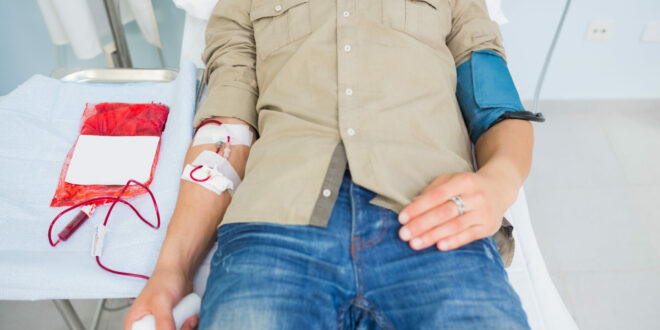Construct a map. It must include all the interstate, state highways, and country or farm-to-market roads. It runs a distance of over 60,000 miles. That is your body’s circulatory system network with its arteries, veins, and capillaries. A human weighing 150 pounds should be around 2.4 to 2.5 cubic feet in volume. Now put all those 60,000 miles in 2 ½ cubic feet, and add all the skeletal bones, the internal organs, and the external skin. That’s what our infinite, omniscient, and omnipotent God did.
The arteries (interstates) carry blood away from the heart. The veins (state highways) carry blood towards the heart. The capillaries (county roads) transport blood between the arteries and veins.. Arteries are the largest, and capillaries the smallest.
This network works together to deliver the life-giving flow of blood to all areas of your body. Without blood, the body dies. “For the life of the flesh is in the blood.” (Leviticus 17:11).
What is blood, and what does it do?
Between 8 and 12 pints of blood are in the body of an average adult.
Blood contains red blood cells, white blood cells, platelets, and plasma. Red blood cells carry oxygen from the lungs to the entire body. White blood cells enable our immune system and defend the body against infections and external dangers such as bacteria and viruses. Platelets are essential for blood clotting and wound healing. Plasma is the liquid portion of blood that accounts for about 55% of blood volume. It transports water, proteins, hormones, waste products, and various nutrients through the body. It also helps maintain the proper blood pressure and pH balance.
Blood is also instrumental in regulating body temperature. When the body is too hot, blood vessels near the skin dilate to release excess heat. When we are too cold, the vessels constrict to conserve heat.
As the body conducts its metabolic processes, it produces waste products such as carbon dioxide, urea, and other byproducts that could be harmful if allowed to accumulate. Blood plasma transports harmful waste products to the organs designed for their elimination, such as the lungs, kidneys, and liver.
Blood is Always Needed to Save Lives
Note these statistics from the Red Cross: Every two seconds, someone in the U.S. needs blood and/or platelets. About 29,000 units (a unit is about a pint) are required every day. The average red blood cell transfusion is approximately three units. One car accident victim can require as many as 100 units of blood. The blood type most often requested by hospitals is type O. Each year, about 6.8 million people in the U.S. donate blood. Red blood cells must be used within 42 days or less. Platelets must be used within 5 days.
The Red River Valley Blood Center gave these additional interesting statistics:
- 5 million American lives are saved each year by blood transfusions.
- Up to 3 lives are saved by one pint of donated blood.
- A, B, AB and O are the four main types of blood types. AB is the universal recipient. Type O negative is the universal donor.
How much is blood worth?
In the United States, blood typically costs hospitals between $180 to $300 per pint. Although individuals donate blood, blood banks have the expense of equipment, buildings, recruiting blood donors, employee costs, and blood storage.
Blood Plasma costs significantly more because of the extra expense of collecting, processing, testing, and storage.
But What is Blood Really Worth?
To the blood recipient whose life has been saved, it is priceless!
But there is blood of much greater value than any blood donor today could give. And this blood was donated as the only cure for a disease much more tragic than cancer, heart disease, or any of the most dreaded diseases today.
That disease is the disease of sin, which condemns the soul to eternal death in the lake of fire with no remedy.
God said, “The heart is deceitful above all things, and desperately wicked:” (Jeremiah 17:9); Paul describes man like this: “There is none that doeth good, no, not one. Their throat is an open sepulchre; with their tongues they have used deceit; the poison of asps is under their lips: Whose mouth is full of cursing and bitterness: Their feet are swift to shed blood: Destruction and misery are in their ways: And the way of peace have they not known: There is no fear of God before their eyes.” (Romans 3:12-18). “For all have sinned and come short of the glory of God;” (Romans 3:23).
The antidote is prescribed in the book of Hebrews. “How much more shall the blood of Christ, who through the eternal Spirit offered himself without spot to God, purge your conscience from dead works to serve the living God?” .” Without shedding of blood is no remission. (forgiveness). (Hebrews 9:14, 22). “the blood of Jesus Christ his Son cleanseth us from all sin.” (1 John 1:7).
The value of Christ’s blood was far more than the thirty pieces of silver Judas received and then threw down as worthless. The apostle Peter summed up the value of THE blood in 1 Peter 1:18-19. “Ye were not redeemed with corruptible things, as silver and gold, from your vain conversation received by tradition from your fathers; But with the precious blood of Christ, as of a lamb without blemish and without spot:”
The infinite, omnipotent, omniscient Son of God loved you so much that he gave His life’s blood to save you. Have you accepted His priceless gift for your forgiveness and salvation?
 The Bottom Line, Ministries Christian News, Articles, & Poetry
The Bottom Line, Ministries Christian News, Articles, & Poetry 





Thanks for a very informative article about all the fascinating things blood does for our bodies, with a great spiritual application.
wonderful dale
i want to write on the wonderful waste disposal system God gave us…but then im british
Dale,
Thank you for your article that was at once educational and served as a powerful message in its entirety.
Love your messages!
God Bless~